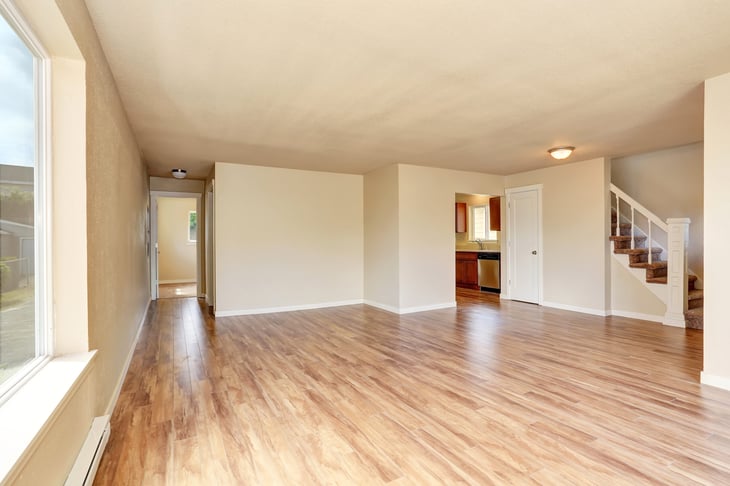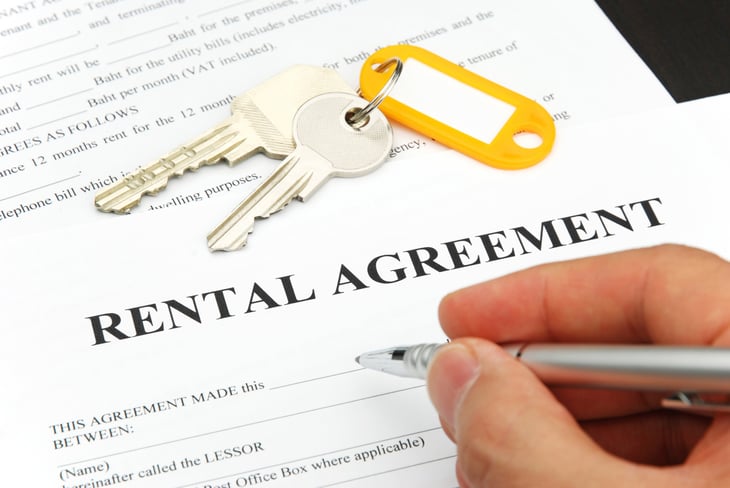
Editor's Note: This story originally appeared on Point2.
Whether you’re planning to save up for a down payment on your own place or simply want to create a sizeable safety cushion, putting money aside each month can be difficult as a renter.
And if you’re struggling to reach your financial goals, you’re certainly not alone. But the good news is that, as tricky as it seems, there are several things you can do to save some cash each month while renting.
It might not be easy, and like anything worthwhile, you may need to compromise on a few things. But if you’re up for the challenge, check out the following tips for putting money aside as a renter.
How to Find a More Affordable Rental

If you’re able to cut down your biggest expense, i.e., the monthly rent, you’ll soon be on your way to realizing your financial dreams.
1. Consider a New Location

The easiest way to reduce your rent is to relocate to a more affordable location, so if this is something you can realistically accommodate, it’s a no-brainer. But take your time and be sure to research various new locations.
While downtown offers convenient access to all the urban amenities you could wish for, renting in the suburbs is often cheaper.
However, there’s more to it than just finding a place with a lower monthly rent. If living in the suburbs requires you to pay a lot in public transport or taxis for commuting or even buying a vehicle, make sure it’s worth making the switch.
It’s all about striking the right balance, but choosing the right location can really see your savings begin to rocket.
2. Search for Rentals in Winter

Real estate trends tend to be fairly predictable, with more listings and a higher demand throughout the summer months.
Meanwhile, winter tends to see things slow down and, while there may be fewer listings, there are also fewer people looking to rent. As a result, rent prices tend to be at their lowest between December and March.
This is a great time to seek out a new rental. You can use the reduced demand to your advantage and try to negotiate a lower rate. Which brings us to our next tip.
3. Don’t Be Afraid to Negotiate

Many rental properties have been around for several years and will inevitably be showing signs of wear and tear. Indeed, even newer properties have their flaws.
Keep that in mind when viewing potential rentals — if you notice anything that looks less than perfect, make a note of it.
Be on the lookout for cosmetic things like cracked tiles, peeling paint or chipped countertops, as well as more significant flaws like dripping faucets, broken fixtures or damp patches.
Take photos, document the issues and use them to bring the asking price down. If you’re fairly handy with DIY, you might also discuss fixing some of the issues for an additional reduction.
4. Look For Long-Term Rentals

Forward planning is key to saving a significant sum of money, such as a down payment. So, if you aim to buy your own place in a few years, it’s well worth looking for a long-term rental.
Landlords tend to favor tenants who will commit to a long-term stay since it ensures a steady flow of income.
Short-term tenants, on the other hand, increase the risk of seeing the property sitting empty between tenants, which means a loss of income in the interim.
As a result, long-term renters can often benefit from reduced rents. So, if you can commit to at least 18 months or two years, you’ll be in a pretty strong position to negotiate a lower rent.
5. Seek Out Unfurnished Rentals

Rental homes that aren’t fully furnished normally have a lower price tag, making them a great option, especially if you have your own furniture and appliances.
Even if you don’t, you could still make it worthwhile if the price is right and you’re happy to buy second-hand goods. You can often find fantastic bargains and even free items at flea markets or online marketplaces.
Just be aware that there are additional costs to consider, such as transporting your new furniture to your rental. Also, think about what you’ll do with everything when the time comes to move out.
There’s a chance you could potentially sell everything to the landlord when you leave, but this should be discussed in advance.
6. Don’t Pay For Features You Don’t Need

Be sure to check what features are included with your rental and make a note of anything you won’t use. Common examples include a parking space and cable TV.
If you don’t own a car, the parking space is useless to you, and in a built-up area, you can bet that it’ll add a significant chunk to your rent.
Likewise, if you don’t watch television or are subscribed to online streaming services instead, cable TV probably isn’t worth paying for.
Approach your landlord and see if you can remove these additional costs from your rent. For example, the landlord could rent the parking space separately to someone who would use it, or they could cancel the cable subscription during your tenancy.
How to Reduce Your Current Rental Expenses

If you’re happy with your current rental, there are still ways to save money. Here are a few ideas.
7. Search for a Roommate

If you’re not planning to move into another place, the next best way to reduce your costs is to find a roommate and split the bills. Your roommate could be a close friend, a partner, or even a stranger.
Just make sure that whoever it is, it’s someone that you’re comfortable sharing your home with.
8. Slash Your Utility Bills and Energy Usage

By reducing your water and electricity usage, you can slash your monthly bills.
Switch from baths to showers, keep doors shut in cold weather, and switch lights off in rooms you’re not using, and you’ll soon start seeing the benefits.
Additionally, if you own a car but could realistically do without, selling it is a great way to make a bit of money.
Plus, with no more gas bills, maintenance costs or insurance fees to pay, you’ll find there’s plenty of spare cash to put into savings.
9. Keep the Decor Minimalist

Most rentals aren’t personal, and decorating them to create a more homely atmosphere is often tempting.
However, investing in things like carpets, paintings and other things can soon become expensive. If you can do without, you could save a lot of money.
Plus, you’ll have to transport them when you move out, which can mean another expense.
As a compromise, consider creating your artwork or requesting decorative items when people ask what you want for your birthday.
10. Make Sure You Get Your Full Deposit Back

When you move out of your rental, you don’t want to lose your deposit if you’re trying to save.
So, be sure to keep things clean during your tenancy, as this will reduce the risk of things like mold and stubborn stains.
Also, take care with bulky items and avoid bashing sharp corners against walls or dragging heavy items across the floor.





Add a Comment
Our Policy: We welcome relevant and respectful comments in order to foster healthy and informative discussions. All other comments may be removed. Comments with links are automatically held for moderation.